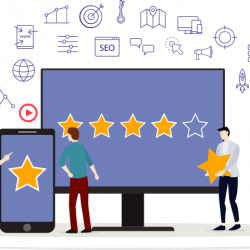Customer management services

The sheer amount of people on social media, particularly Instagram and Crunchyroll, speaking about Customer Relationship Management Services keeps on growing monthly. Tell me your thoughts on Customer Relationship Management Services?
CRM aims to converts leads into contacts, which is to say leads that have expressed interest in buying your products, or have bought in the past and, you hope, will buy again in the future. Some CRM software comes equipped with AI. This can offer a range of benefits, including more effective pattern recognition, which can draw on past successes to shape more effective future sales strategies. CRM solutions allow a company to maintain relationships with customers by knowing what they want and when they want it. Therefore, targeting the correct products or services to the correct customer or prospect could potentially lead to an increase in sales and thus increase in profits. A CRM can help with nurturing existing relationships and acquiring and building new ones. Customer experience, by definition, relates to every interaction a customer has with your company from unknown website visitor to full happy customer for life. CRM should be looked upon as the technical backbone to help manage this entire journey. A CRM system helps you go deeper with all your data and metrics, including those from other sources. When your company is dedicated to maintaining clean data, or data free from errors, you can use your CRM platform to collate, tabulate, and organise that data, which is then easy to interpret with reporting features. This is one of the biggest benefits of a CRM system, and it trickles down to other benefits that become available once you have this usable data. As more companies continue to raise the bar for customer experiences, it means a business must bring its CRM capabilities up to par with market expectations or risk losing customers.

In today’s consumer environment, customer experience is absolutely crucial. It’s not just about providing customers with great products and services, and it’s also a matter of ensuring their whole experience of engaging with your business is as smooth, straightforward, and simple as possible. Quaint as it may seem, paperwork is still a significant part of many businesses’ day-to-day operations. A lot of that paperwork could be eliminated with a CRM system. Cutting down on wasted time increases the ability of the employee to get on with the kind of work that brings real value to the organisation. CRM automation helps you save time by replacing manual tasks with the additional follow-up feature. Even one of their client who is a business owner can attest to the fact that he has been able to save 5 to 7 hours a week from automating his tasks. You can spend that time on converting more leads and closing deals. The new leads capture automatically takes leads from contact form to booked appointment. Keeping track of these new styles of interactions can be challenging. A spreadsheet certainly won’t cut it. A proper customer relationship management (CRM) system goes beyond simple contact tracking by keeping a complete audit trail of every interaction your staff has with each customer. This can include everything from the customer’s initial purchase, to support calls and what they were about, to a regional sales rep’s notes from a meeting or call, and so on. A CRM system allows you to track, analyze, and surface this data when it’s needed, often including integrations with other software systems. The confusion surrounding CRM Software Review may be explained by the lack of a widely accepted and clear definition of how the results are achieved.
Work Together To Win More Deals
A key role of the CRM process is to ensure the customer centricity and relevancy of the organization by embedding the customer perspective in all business activity. In effect, a firm must be able to ‘replicate the mind of the customer’ if it is to provide the kind of individual or customized service that will attract, retain and grow profitable customer relationships. If the last quarter of the twentieth century heralded the dawn of a new competitive arena, in which commoditized products and services have become less reliable as the source for business profitability and success, it is the new computer technologies and applications that have arisen that assist companies in managing their interactions with customers. These technologies have spawned enterprise-wide information systems that help to harness information about customers, analyze the information, and use the data to serve customers better. Many organizations lack a well-designed approach to recording information about customer interactions in such a way that the information is broadly visible and actionable. Everything is handled in e-mail or in monthly reports that are arduously created, reviewed once, and then tossed into a folder somewhere. There is no platform for systematic information gathering. Running an organization of any size this way is analogous to flying a plane without any instruments. You are operating on anecdote and “feel” and have little ability to forecast the future or learn from the past. Because implementing CRM technologies and adopting customer strategies require supply-chain activities to be coordinated with and integrated into demand-chain activities, it is clear that managing customer relationships should no longer be thought of as a purely “customer-facing” set of business processes. By analyzing customer data in a CRM, marketers can assess the effectiveness of all the aspects of the existing marketing practice, including strategy, planning, budgeting, campaign design, implementation, customer communication, and so on to identify shortcomings and suggest improvements. Managing customer relationships is a complex and ongoing process and a system with CRM System Review will reflect positively on itself.
A successful CRM software accomplishes the objectives above by connecting multiple subsystems from marketing, sales, and customer service and providing broad-reaching functionalities. Although customer relationship management is often considered the remit of marketing as it builds on the tenets of relationship marketing, in practice it forms part of the job of every employee in every department. This sharing of customer responsibility compounds the difficulty of agreeing specific measures that will accurately reflect CRM performance and strategic progress. The value proposition of each firm is a multifaceted package that customers experience, including the product, service, process, price, communication, and interaction. A customer strategy helps build and maintain a portfolio of customers through an understanding of their expectations, competitor contexts, and customer affiliations. While handling any type of business, you always deal with your customers’ data all the time. A CRM with analytics will give you a detailed insight about your customers and help you stay ahead of the curve by tracking trends and events that will allow you to gain all the information you need. Gathering all customer-related information at a granular level will also help you to conduct an analysis and execute business decisions that are driven by intelligence, rather than just guesswork. A good CRM contains all kinds of information and is the meeting point for different departments within the company. The lack of interdepartmental cooperation creates situations of information asymmetry, redundancy, and difficulty in retrieving data. An effective CRM Software Reviews must be capable of measuring and communicating the return on investment (ROI).
Increase Visibility With A CRM
A CRM software program allows not only to be more efficient and produce higher quality work, but also to improve your relationship with your customers. However, depending on the CRM system results can vary, there’s no best CRM software per say, it depends on the activity and structure of your company. Clients are a source of information regarding needs and preferences. Their opinions, registered in the CRM, are significant for improving the variety and quality of products and increasing the company’s productivity. With the histories and knowledge on the purchasing behavior of clients, the marketing department can resort to personalized communication, or aim it at specific segments. CRM data helps your marketing team identify, capture, nurture and convert leads. They can monitor drip campaigns within the sales cycle and track interactions to ensure a satisfactory and consistent customer experience. A good CRM system builds a framework for the information managed in your organization. Sales, marketing, and operations information needs to live in the same system because relationships reach across all those departments. Relationships represent the lifeblood of any organization, even those that don’t outright sell products or services. The better you can understand and learn from those relationships, the more valuable and efficient you and your organization are. When you’re deciding how to choose the right CRM for your business, there’s a lot to consider. Some essential criteria apply to most businesses seeking CRM solutions. Additional considerations apply depending on the size and nature of your business. Relationship marketing can be assisted by purchasing the right system which means making sure the right CRM Reviews are in place.
To ensure that technology solutions support CRM, it is important to undertake IT planning from a perspective of providing a seamless customer service across channels, rather than planning activities from a departmental or functional perspective. Such a customer-centric approach to IT planning will ensure that customer information is used effectively to maximize customer value and the customer profitability. CRM software is a special system with one primary purpose – improving relationships with clients by providing businesses with smart tools to effectively develop a successful strategy. In other words, CRM software can accelerate crucial business operations, such as marketing, service and sales activities, to boost customer experience and loyalty from initial contact to repeat purchases. A centralized CRM database unifies information across departments and teams, allowing you unlimited access to lead and contact information, purchase histories, inventory, sales, and marketing information. When your sales reps are on the beat, they’ll be able to have access to a client’s interactions with other departments like service and support, meaning they’re well-positioned to anticipate customer demand. In a nutshell, CRM is a management concept based on established marketing principles that recognizes the need to balance organizational and customer interests carefully. CRM is not a result primarily of technological solutions but is rather a strategic orientation supported by them. These complex sets of activities together constitute the basis for a sustainable and difficult to imitate competitive advantage, the customer-centric organization. Reducing costs is another purpose of customer relationship management. Customers often will complain about something or show dissatisfaction for some product or service. This is normal in business but, if there is a growing trend against a product or service, a CRM system will help the business recognize this quickly. By cutting off these costs, the company can keep from spending money in the wrong places and funnel that money into more effective areas. In an ideal world, a CRM system would be reviewed extensively by users and the results placed on a Best CRM Software site for all too see.
Exceptional Customer Service
Sales reports and marketing reports play a huge role to understand the performance of the teams and the business. CRM software can help managers pull up template reports and create custom reports for exclusive use cases. With a variety of options available, it is common for some CRMs to be more complex than others so they require some training in order to get the most out of them. The problem is that getting familiar with these programs requires a considerable amount of time and not everyone is willing to make that commitment. There are successful organizations that do not have “products,” but there is no such thing as a successful firm that doesn’t have “customers.” And despite the fact that the world has billions of people, only so many of them will ever want a particular company’s offering. Check out supplementary intel on the topic of Customer Relationship Management Services at this Encyclopedia Britannica entry.
Related Articles:
The Leading 9 Benefits Of Customer Relationship Management Platforms
The Practicality Of CRM Services
What Are 7 Favourable Reasons To Use Customer Relationship Management Systems?






Ingen kommentarer endnu